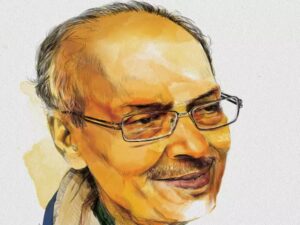–by Amanita Sen
–Reading Time – 12 min Approx
What struck me at first as I browsed through the book “Of ashes and persiflage” is the layout of the pages. There was so much whiteness in each page. But it came as no surprise, as by now I know, brevity of expressions is quite the forte of Prof Aneek Chatterjee. Like the pages of his book, he gives enough space to his readers to pause and ponder on the few words he writes to hit the nail on the head with the message of the poem.

In his 6 liner poem “Agony”, the reader cannot but stop at the words “enter”, “exit” , “indifferent”, “different” and find new interpretations to them. Dwelling at a place for some time has the potential to transform us from within. Exiting then, makes everything look different because of the innate learning from the experience. It is as if the poet in such few words opens out for his readers a vast sky of thoughts.
Poetry has this quality of holding the mirror to the readers’ mind. While the mirror is much about predictability, reflecting the same old face, good poetry leads us to the unknown corners of our mind surely but subtly. The element of surprise marks Prof Chatterjee’s poems.
In the very first poem “Dilapidated wall” the poet writes “The train that slowly moved past a dilapidated wall / pink flowers, suddenly took a reverse gear.” The reader is bound to be taken by surprise at this.
“Dilapidated wall crumpled several times”. Not usual for a wall to crumple several times but then we know the unreality factor can only add to a poem. And in the end when the train created the rhythm of safety and silent laughter, the reader sighs with relief. By that time the boy in the poem has won the readers’ hearts.
To a person like me who is familiar with Prof Chatterjee’s poems, the twist in the end that many of his poems have, is a thing most looked forward to.
The tone of the poem, “The afternoon is grey” feels unassuming until the end when it came unexpectedly to the readers “But I never knew I loved grey so much.” Here the poet almost loses his guards with his tender emotions. It would not be wrong to say that one has to be cautiously on the lookout for such spurts with this poet. Because he quite knows how to hide it behind metaphors that look casual, yet carries with elan the weight of the true feelings.
“But the naughty beast fled
from the spot
to a tree to
and I flew again
and I flew again from tree top”
A subtle humor underlines the poem “Coveted Seat”. The visual element in the poem can never be missed. The balloon’s journey is a picturesque one. How with the metaphor of balloon the poet shows our own search for that ever-elusive coveted seat.
” A few urchins only saw green
mangoes swinging
in front of their eyes
They threw stones at the tree
to have a taste of green fruits,
but in vain.
Hence the ghost laughed”.
Reality is where the poet finds his fodder from, for his poems. Finding Hydroxychloroquine, the word-entrant to our pandemic times vocabulary in the poem “This Summer” felt natural, not to mention pleasantly familiar. Also the ghost here in the poem laughing obnoxiously in the end reminded me of the ghosts we find in the stories of the noted Bengali novelist Shirshendu Mukherjee. In the garb of the ghost the poet here is in his satirical best.

“Only the drain on the roadside laughs
the death of myriad flowers’..
“But a morbid morning says “Goodbye”..
Comparing morbidity to dead flowers in the poem “Goodbye” the poet makes us linger on the dreams that change every night. Dreams are the cherished events when mornings offer little hope and joy.
“Chair looks at the corpse
for one last time,
and status.”
The poem “Of ashes and persiflage” that makes the title of the book tosses in the concept of mortality in the backdrop of a crematorium where the corpse lies to be devoured by the fire. The banality of our ego, our mortal achievements is hinted at with a tone that takes death into its stride as an end that preaches us much on the act of living, the principles that can be abided by keeping mind that death is all-pervasive.

Like an artist wielding his brush and colours leisurely, in the poem “Grasshopper” the poet writes ,
“It was bright orange, attractive
when I started, and a new alcoholic
yearned to touch the line..”
This word ‘alcoholic’ made me pause and revisit the lines. The poet was drunk in the beauty of the moment until the darkness jumped on the earth like grasshopper. One is left to wonder, is it a universal thing to be left dejected at the moment when one feels he is at the top of the world. Is it not an unwritten contract between the poet and his audience to handhold him to the ubiquitous through all that is truly personal?
The poet’s attraction to his city is almost in the fashion of a lover.
“I float and finally
descend down on
the skin of narrow by lanes
and avenues;
in the heart of the city centre
and discover me there
fresh as ever”
In the poem “Resurrection” the poet is prolific about his feelings for the city. It gives him some clarity on the deeper inaccessible areas of the mind, it raises the question on what can rejuvenate us.
The titles of Chatterjee’s poems are mostly to watch out for. Mostly one-word ones, they are eloquent and give in a lot of the hidden hints inside the poem. One such title is “Ephemeral”.
“We departed soon, without
fixing any time and place for our
long chat..
thrice in four years”…
There is something truly flitting about these meetings. The reflection that I see from the mirror of a poem like this, is of the temporality of relationships. While they hold the promises of growing deeper, that never happens for real. Life is often not predictable in terms of who stays back for us and for how long, in what manner!
In his characteristic subdued but firm tone, in the poem titled “Ignorant” he writes,
“But I have never come to know
white flowers and
disgruntled poems;
agony of potholes and
the specter of dreams
the leader constructs
so carefully everyday.”
It is impossible to live in the world at this time of history and not feel stirred by the false promises, the hypocrisies, the lies that we are fed with, by our leaders. He adds them poetically with the disgruntled poems, white flowers and the tormented potholes suggesting a certain hopelessness that these adjectives carry.
The last poem “Tramlines and the man” besides speaking of the uncertain times, nourished well my Bengali sensibility. Would urge the readers to find out how it does so.
The poet quite strikes the right balance with the vulnerability-a quality which marks a good poet, and their brilliant metaphoric expressions. But at no point he goes over the top to drive home the point.
A book from Hawakal, this one surely satiates our appetite for good poetry.
–by Amanita Sen


